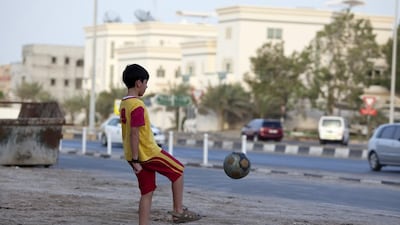ABU DHABI // Every community in Abu Dhabi will have new social, educational, cultural, recreational and health-care facilities under sweeping new planning rules.
The regulations will apply to developers planning new communities, and to the redevelopment of existing neighbourhoods. They vary according to population.
An area with between 6,000 and 10,000 residents, for example, must have access to a community centre, a police point, an early-learning centre and a small medical clinic.
A larger district centre would have a post office, a large health clinic, a library, a sports centre, municipal offices and a community support centre. This would be applicable to developments with 30,000 to 40,000 residents.
For every 80,000 residents, a sub-regional centre will have an urban community support centre, a cultural centre and a multipurpose hall.
The new Abu Dhabi Community Facility Planning Standards are based in part on a study of 11,000 households, which asked about residents’ use of community services and the facilities they would like to have in their area. Many complained about a lack of community facilities.
“From the survey we saw the issues they have: what is good and what is bad, what is available in terms of community facilities and what is not,” said Humaid Al Marzouqi of the Urban Planning Council.
“For example, in some communities they were saying ‘we do not have enough clinics’. Some of them said ‘we are suffering in terms of the number of services’.”
The new planning manual took almost two years to complete and was created in collaboration with 12 other agencies, including the Department of Municipal Affairs, Abu Dhabi Education Council, the Health Authority Abu Dhabi and Abu Dhabi Tourism and Culture Authority.
“The Government recognises that successful, healthy and sustainable communities are well served by a full range of community facilities that are appropriate to residents’ needs and which are accessible to all,” said Amer Al Hammadi of the Urban Planning Council.
The new regulations, he said, “will ensure that community facilities are considered right from the start of the planning process so that everyone in Abu Dhabi has equal access to community facilities”.
Any new development of at least 2,000 permanent residents will be governed by the regulations. The standards will be applied on a case-by-case basis to existing communities as and when they are undergoing redevelopment, Mr Al Hammadi said.
Under the guidelines, the provision of facilities such as schools, police and petrol stations will be calculated according to the demographic breakdown of the development. For example, a police station is required for every 50,000 residents.
Other community facilities such as universities, colleges, amenities for the elderly, museums, galleries, waste management facilities and cemeteries may be required depending on the size and scope of a development but will be decided on a site-by-site basis.
Government agencies that played a part in creatingthe new guidelines welcomed the project. “We believe that such an initiative will significantly contribute to raising the quality of urban living in the emirate and serve the greater public interest,” said Khalid Hadi of Adnoc.
The health authority said the new regulations would improve the quality of life. “The publication of these standards is a major step forward in ensuring that the health-care needs of communities are met as the emirate grows,” it said.
“The standards ensure that all new communities have local access to health-care facilities, which will lead to improved health of our residents.”
jbell@thenational.ae

